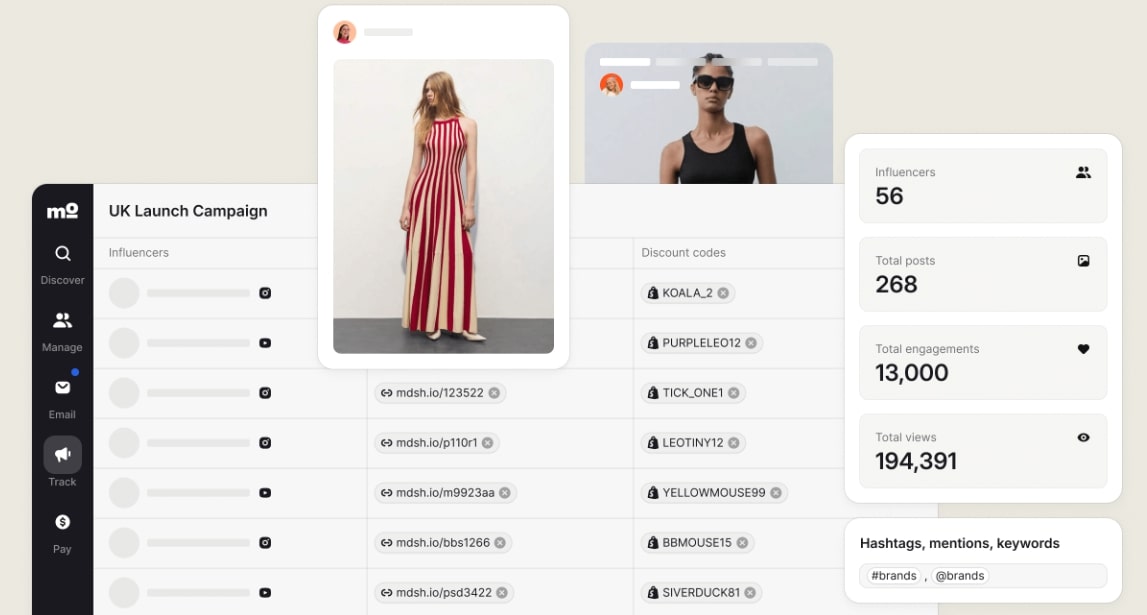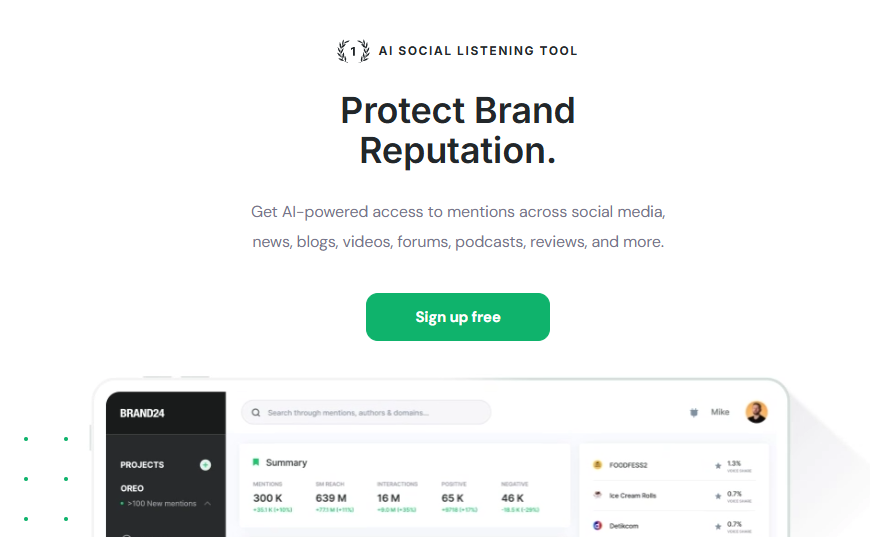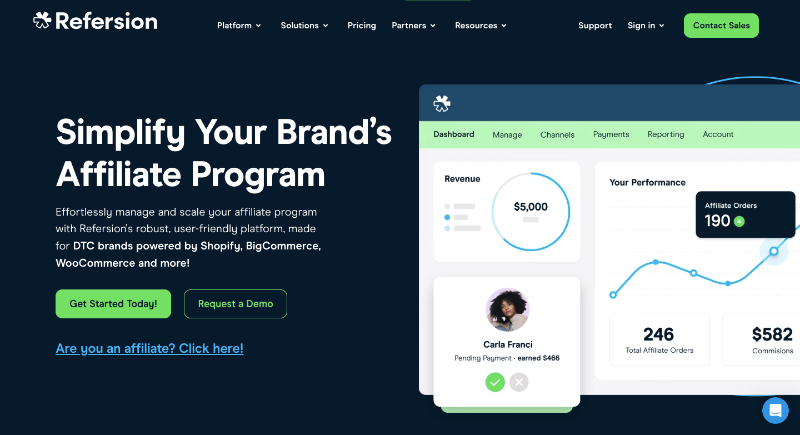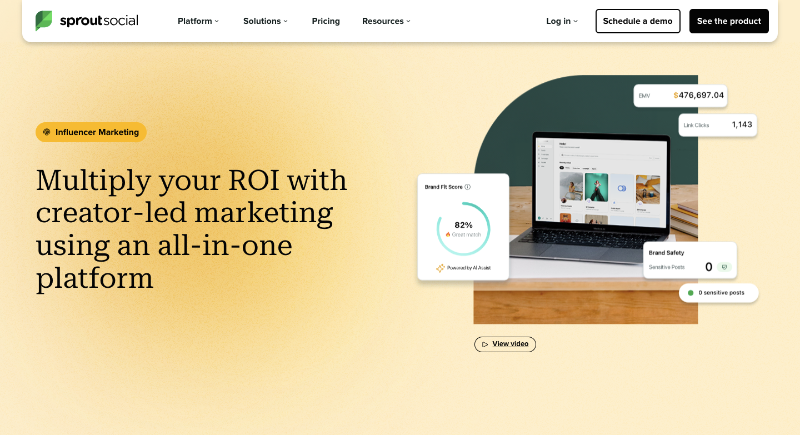It’s campaign launch day – congrats 🎉 Now you can sit back, relax, and wait for all that influencer content to go live so you can start tracking clicks and sales, right?
Not if you have to track influencer content manually. Without a tracking tool to handle all the heavy lifting, you’ll have to gather links to all those live posts yourself – including rushing to screenshot Instagram Stories before they vanish – and ask your influencer partners to share their own analytics post-campaign. And the more you grow, the more painful it becomes to track what influencers are doing and how their content is performing 🤦🏻♀️
That’s why I’ve shared this list of the 10 best influencer tracking tools. But first, let’s clarify what we’re talking about here…
What do we mean by “influencer tracking”?
There's a few different ways to interpret the phrase “influencer tracking”, and this post will give tool ideas for all of them. They are, primarily:
- Monitoring what your existing influencer partners are posting, including creatives, copy, and ad disclosures.
- Measuring the performance of those posts in terms of reach, engagement, traffic, sales, or any other KPI.
- Tracking keywords, hashtags, or mentions to find new influencers that are talking about certain topics.
All are important for an effective influencer marketing program.
Doing them manually might be viable in the very beginning, but it'll quickly get out of hand. Whether that is manually screenshotting Instagram Stories or copy-pasting metrics into your sheet every day, it's not scalable. Choosing the right tools will set you up for sustainable growth.
Now I’ve cleared that up, let’s get straight into my roundup of the best influencer tracking tools…
1. Modash

🥇 Best for: Influencer tracking & campaign management for brands using Shopify
🤔 What is it: Modash is an end-to-end influencer marketing platform for Shopify stores. Use Modash to find and outreach influencers, track their content, monitor results, and handle payments. Save time on repetitive, labor-intensive tasks like creating affiliate links and ordering influencer products using our market-leading Shopify integration.
🆓 Free trial: Yes, 14 days, with usage limits.
💵 Price: Paid plans start at $199/month (paid annually) or $299/month (paid monthly). 👉 Modash Plans and Pricing
📱 Platforms: Instagram, YouTube, TikTok
✅ Influencer tracking features:

Modash’s influencer tracking features automate the process of collecting influencer content (even Stories). Everything gets saved to a dashboard so that you can:
- Review, organize, and share the creatives – all from one place
- Check who has posted
- See how influencer content performed

As well as content, you can keep track of all your key campaign metrics, including:
- Content metrics like how many influencers have posted, how many pieces of live content you have
- Awareness metrics including views, engagements, EMV, and more
- Performance metrics including clicks and sales

To track influencer content, you simply need to create a campaign and specify certain hashtags and mentions. After that, the tracking tool will refresh regularly to find new content. It’s also possible to get alerts when ad disclosures or mandatory hashtags are missing.
Additionally, you can create…
- UTM tracking links
- QR codes
- Affiliate tracking links
- Promo codes
...per influencer, and track their usage.

Or use Event Mode to track everything posted during your campaign period, even if the influencer forgets to add the right tags. That way, you never risk under-reporting results.
👍 Other key features:
Outside of influencer tracking, Modash is built to support end-to-end influencer marketing workflows. Particularly for ecommerce brands on Shopify. You can:
- Find influencers in a 350M+ database using filters and/or AI, lookalikes, or by checking your followers/email list
- Check the audience demographics & performance of any creator, so you can review creators before you go to the trouble of reaching out.
- Connect your Gmail/Outlook to send personalized email outreach quicker (without being spammy).
- Integrate with Shopify to send products to influencers without all the back-and-forth of asking for addresses, size, colors (etc.)
- Pay influencers based on fixed fees or performance-based affiliate commissions
Try Modash for free (no credit card needed).
🤝 Used by: Birkenstock, Bonprix, Victoria’s Secret, Mont Blanc, Sennheiser
✨ Review score: ★ 4.9/5 (Capterra), ★ 5/5 (Shopify App Store), ★ 4.9/5 (G2)
📣 Testimonial: “Before finding Modash, I spent months extensively testing platforms, and they all had issues. Finding Modash was brilliant because it not only covers influencer discovery, but it can collect and track our influencers' live content reliably. Without having to ask them all to sign up to anything.” – Ayme Mendes Da Costa, Influencer Marketing Manager at REGALROSE
2. HypeAuditor

🥇 Best for: Analyzing market trends and gathering competitor insights
🤔 What is it: HypeAuditor is an all-in-one influencer marketing solution covering influencer search, recruitment, management, content tracking, payments, and more.
🆓 Free trial: Yes
💵 Price: HypeAuditor doesn’t share pricing information – although G2 says it’s 31% more expensive than the average mid-market influencer marketing platform.
📱 Platforms: Instagram, TikTok, Twitch, X/Twitter, YouTube
✅ Influencer tracking features:
Although HypeAuditor supports five social networks, it only tracks influencer content on three of them – Instagram, TikTok, and YouTube. And it can’t capture Instagram Stories, so you’ll have to do that yourself. Which is a pain.
Still, there’s plenty of content it can track (specifically, Instagram posts and Reels; YouTube videos and shorts; and TikTok content). Just tell HypeAuditor which mentions, hashtags, or phrases you want to track and everything else happens automatically.
You can also track orders, fulfillments, and other status updates on autopilot by connecting HypeAuditor to your Adobe Commerce, Shopify, or WooCommerce account.
👍 Other key features: HypeAuditor analyzes your competitors’ influencer activities – including campaign budgets, performance, and which influencers they collaborated with. It also offers a market and trends analysis feature to let you find untapped growth opportunities by analyzing social media trends and rankings.
🤝 Used by: Dior, H&M, Philips
✨ Review score: ★ 4.6/5 (G2), ★ 4.3/5 (Product Hunt), ★ 4.8/5 (Capterra)
📣 Testimonial: “Using HypeAuditor, we’ve been able to expand our influencer marketing strategy, build relationships with proven influencers, and save time on reporting.” – Flora Macher, Influencer Relations Manager, Moon Magic
🤓 Further reading: 11 HypeAuditor Alternatives For Better Influencer Marketing
3. Brand24

🥇 Best for: Tracking mentions and hashtags across the widest range of online sources
🤔 What is it: Brand24 is first and foremost a social listening tool, but its ability to track hashtags and brand mentions makes it a viable option for handling some elements of influencer tracking.
🆓 Free trial: Yes, 14 days
💵 Price: From $199 per month
📱 Platforms: Bluesky, Facebook, Instagram, LinkedIn, Reddit, Telegram, TikTok, Twitch, X/Twitter, YouTube, and more
✅ Influencer tracking features:
Brand24’s biggest strength is the sheer range of platforms on which it can search for mentions – I’m talking 25+ million online sources across multiple categories, including social networks, blogs, and forums. Use the platform’s built-in analytics to track the reach of brand mentions and create automated reports to share with your team.
The data goes beyond numbers to let you search what’s been said about your brand at any given time period. By narrowing your search with different criteria, you’ll be able to see who your most influential audience is. Or filter by sentiment to discover who’s been saying mean things behind your back.
The only real downside of using Brand24 for influencer tracking is that you can’t use it to measure the impact of your campaigns, such as how much traffic and revenue you’ve generated.
👍 Other key features: Brand24’s social listening functionality helps you understand what people like (and dislike) about your company. You can also use the platform to find relevant influencers through hashtag searches.
🤝 Used by: Carlsberg, Samsung, Uber
✨ Review score: ★ 4.6/5 (G2), ★ 8.9/10 (TrustRadius), ★ 4.7/5 (Capterra)
📣 Testimonial: “We use the data to verify if the strategy we’ve implemented delivers the results we expected. From that perspective, Brand24 is a key tool for evaluating how effective we are as a marketing team.” – Szymon Szymanski, Chief Growth Officer at XTB
4. Refersion

🥇 Best for: Tracking influencer sales in real time
🤔 What is it: Refersion is primarily an affiliate marketing platform. But tracking is an essential part of running an affiliate program, so it also offers robust content tracking tools.
🆓 Free trial: Refersion has a free trial landing page, but it’s not signposted from their homepage or pricing page… so it might not be offered anymore 🤷
💵 Price: Paid plans start at $39 per month plus 3% of all affiliate-generated sales.
📱 Platforms: n/a
✅ Influencer tracking features:
If you’re looking for a tool to automatically collect live influencer content, Refersion ain’t the one. It doesn’t do that sort of influencer tracking at all. But it excels at first-party tracking, giving you a clear picture of where clicks and sales are coming from. Monitor influencer performance in real time and use the built-in analytics to make data-backed decisions.
👍 Other key features: Refersion also streamlines the process of paying affiliates and influencers. Set your own commission rates by campaign, partner type, or product; set up tiered rewards to incentivize high performance; and pay affiliates in one click in 150+ currencies via dozens of payment methods.
🤝Used by: Dermalogica, Flooret, OSEA
✨Review score: ★ 4.7/5 (Shopify App Store), ★ 4.2/5 (Capterra), ★ 3.6/5 (G2)
📣Testimonial: “Refersion was essential in supporting the immediate growth of our affiliate marketing program. Working with Refersion allowed us to see everything in one place and scale our program beyond what we imagined it could grow to be.” – Ana Montilla, Social Media and Influencer Marketing Manager at Verb
5. Google Analytics

🥇 Best for: Tracking inbound traffic and conversions from influencer partners
🤔 What is it: Google Analytics isn’t an influencer marketing tool at all. Rather, it’s the world’s most popular web analytics platform, making it a great fit for tracking traffic and conversions generated by your influencer partners.
🆓 Free trial: n/a
💵 Price: Free
📱 Platforms: n/a
✅ Influencer tracking features:
Google Analytics allows you to track just about anything on your website.
By adding a UTM tracking code to an influencer’s URL, you’ll be able to track performance for campaigns and individual influencers – including how much traffic they’re bringing to your site, and whether those people go on to complete your desired objective (like completing a lead capture form or making a purchase).
GA also shares content engagement metrics, including the number of pages visited in an average session, how long visitors spend on a page, and how deep they scroll. This helps you understand how well your content resonates with your audience, and whether your influencer partners are sending the right people to your site.
👍 Other key features: Use Google Analytics for anything related to web analytics, from identifying your top traffic sources and channels, to discovering the most-visited pages on your site.
🤝 Used by: Adidas, Minted, Rituals
✨ Review score: ★ 4.5/5 (G2), ★ 8/10 (TrustRadius), ★ 4.7/5 (Capterra)
📣 Testimonial: “Google Analytics allows us to look at our data across platforms – web and app – to understand the full journey of our users. We’ve been able to cut our reporting time by 50%.” – Sara Swaney, Director of Advancement at 412 Food Rescue
6. Upfluence

🥇 Best for: Integrating with a wide range of third-party tools
🤔 What is it: Upfluence is an all-round affiliate and influencer marketing platform that integrates with tools like Amazon, Klaviyo, and Shopify, making it a popular choice among ecommerce brands.
🆓 Free trial: Yes
💵 Price: The Upfluence website contains zero pricing information, but G2 lists one pricing edition at $478 per month.
📱 Platforms: Instagram, Pinterest, TikTok, Twitch, X/Twitter, YouTube, WordPress blogs
✅ Influencer tracking features:
Upfluence tracks influencer content across six social networks, including Shorts, Reels, in-feed posts, dedicated videos, and even Stories. All are available through a single dashboard, where you can also monitor the progress and status of several influencer campaigns at once.
Need to share influencer content and data with stakeholders who don’t use Upfluence? No bother – just export everything to PDF.
The platform also offers detailed reports combining engagement and sales metrics, giving you a clear understanding of which content is resonating with your audience and driving revenue.
👍 Other key features: Upfluence is a dedicated, end-to-end influencer marketing solution – so you can use it for everything from influencer search and outreach to relationship management and payments. It also integrates with more third-party tools than any other influencer platform I can think of, covering use cases like ecommerce, email, and payment processing.
🤝 Used by: Benefit, HelloFresh, Revolut
✨ Review score: ★ 4.6/5 (G2), ★ 4.2/5 (Trustpilot), ★ 4.3/5 (Capterra)
📣 Testimonial: “Upfluence has created ease in tracking sales, organizing, and managing our influencers.” – Megan Cody, Director of Brand Marketing & Creative, Branded
🤓 Further reading: 10 Upfluence Alternatives For Cost-Effective Influencer Marketing
7. GRIN

🥇 Best for: Sharing captured influencer content via third-party tools like Dropbox
🤔 What is it: Whereas some influencer marketing platforms focus on a specific niche (like how Modash is aimed at Shopify stores), GRIN works with brands of any size, in any niche, and with any level of influencer program maturity. It’s an end-to-end tool capable of handling everything from influencer search to campaign management to payments.
🆓 Free trial: No
💵 Price: While GRIN doesn’t share pricing information, Capterra quotes a starting price of $999+/month.
📱 Platforms: Facebook, Instagram, Pinterest, Snapchat, TikTok, Twitch, X/Twitter, YouTube
✅ Influencer tracking features:
GRIN automatically pulls in and catalogs content by campaign, influencer, and platform. Search for a specific piece of content using tags, keywords, content type, and even color – smart stuff! – and collaborate with other stakeholders by syncing with tools like Dropbox and Google Drive.
However, it’s not all good news, because GRIN can only track content featuring the correct hashtag or mention. In other words, if your influencer partner incorrectly tags their post, GRIN won’t pick it up.
It also has a bunch of platform-specific rules, like how tags on TikTok must be added in the caption rather than the “tag people” option. More rules = more chance of errors = more missed content 🤦
👍 Other key features: GRIN is another end-to-end platform, so you can use it for influencer search, campaign management, payments, and everything in between. Find brand-fit influencers by browsing a database of 190+ million influencer profiles, or generate inbound applications using the influencer landing page builder.
🤝 Used by: ColourPop, Skims, Vera Bradley
✨ Review score: ★ 4.5/5 (G2), ★ 4.7/5 (Capterra), ★ 6.2/10 (TrustPilot)
📣 Testimonial: “GRIN has allowed me to automate processes, saving me time, money, and allowing me to scale my influencer programs.” – Lydia Lee, Affiliates and Ambassadors at Nutpods
🤓 Further reading: 12 GRIN Alternatives For Better Influencer Marketing & Discovery
8. Awario

🥇 Best for: Measuring growth in brand mentions
🤔 What is it: Again, Awario doesn’t specialize in influencer marketing. But, as a brand monitoring solution, it offers some helpful tools for monitoring the performance of your influencer partners.
🆓 Free trial: Yes, seven days (with limits)
💵 Price: Paid plans range from $49 – $399 per month.
📱 Platforms: Facebook, Instagram, Reddit, X/Twitter, YouTube, plus the wider web
✅ Influencer tracking features:
Awario is a lot like Brand24. It, too, monitors brand mentions across a vast range of platforms, crawling 13+ billion web pages a day across social networks, blogs, news sites, forums, and more.
Use Awario’s analytics to measure growth in brand mentions, plus their collective reach. It supports Boolean search, which is useful for weeding out irrelevant results. And you can sort mentions by sentiment – positive, neutral, or negative – and track keyword usage in any language and location.
All good stuff. But, like Brand24, Awario won’t tell you how many clicks or sales your influencers have generated.
👍 Other key features: Awario has some nice features beyond brand monitoring, including the ability to identify top influencers by social network. It also offers a smart lead gen tool that flags up potential sales opportunities, such as people asking for product recommendations or complaining about competitor products.
🤝 Used by: Content Amplified, Michael Ruiz Consulting, UpJourney
✨ Review score: ★ 4/5 (G2), ★ 4.3/5 (Capterra)
📣 Testimonial: “Awario provides opportunities for crucial product feedback and encourages people who are speaking positively about your product.” – Kyle Lawrence, Co-Owner & Developer at Design & Develop
9. GameInfluencer.IO

🥇 Best for: Influencer recruitment and tracking for games developers
🤔 What is it: GameInfluencer.IO is an influencer platform created by influencer marketing agency GameInfluencer. As you can probably guess from the name, it specializes in the games, web3 gaming, and creative industries.
🆓 Free trial: No
💵 Price: Unlisted
📱 Platforms: YouTube only (although other platforms, including Twitch, could be added soon)
✅ Influencer tracking features:
GameInfluencer.IO tracks influencer content using various third-party analytics and tracking platforms, including Adjust, AppsFlyer, BuffPanel, Google Analytics, Kochava, and Tune. That’s really all I can tell you, because their website is pretty low on detail.
👍 Other key features: GameInfluencer.IO helps users to find relevant influencers – even from beyond the gaming niche. It also supports influencer payments.
🤝 Used by: Goat Games, PONOS, Sandbox Interactive
✨ Review score: n/a (trust me, I looked, but I couldn’t find any reviews on third-party platforms)
📣 Testimonial: “Results have been great!” – PONOS
10. Sprout Social Influencer Marketing (FKA Tagger)

🥇 Best for: Creating customized influencer marketing performance reports
🤔 What is it: Sprout Social isn’t just one of the biggest names in social media management and analytics – it also has a dedicated influencer marketing solution, having acquired the platform previously known as Tagger (RIP).
🆓 Free trial: No
💵 Price: FYI, Sprout Social Influencer Marketing is a standalone product, so you don’t need a regular Sprout Social account to sign up. No idea how much it costs, though, because Sprout doesn’t share pricing information for its influencer marketing solution 🤷
📱 Platforms: Facebook, Instagram, Snapchat, TikTok, Twitch, X/Twitter, YouTube
✅ Influencer tracking features:
Sprout automatically populates all your influencer performance data into a report, which can be customized to fit your specific needs or based on prebuilt templates. Traffic and conversions are tracked through affiliate links and/or pixels.
However, there are some limitations to Sprout’s tracking capabilities. Most significantly, influencers need to opt-in and you need to add them to a campaign in Sprout – otherwise, their content won’t be tracked. By default, the platform doesn’t pull in mentions via stickers or tap tags; you need to activate a separate integration for this. And if an influencer doesn’t correctly add the right hashtags, keywords, or phrases, their content won’t be picked up.
👍 Other key features: Like all the other end-to-end influencer marketing platforms, Sprout’s functionality spans influencer search, recruitment, campaign management, content tracking, reporting, and payments. It also offers some neat competitive analysis and trend reporting tools to help you develop your influencer marketing strategy.
🤝 Used by: KISS, Trello
✨ Review score: ★ 4.3/5 (G2)
📣 Testimonial: “Learning how influencers are using Trello and which influencers are using it helped guide our campaign.” – Brian Cervino, Product Marketing Manager at Trello
Features to look for in influencer tracking software
I’ve included 10 influencer tracking tools in this article, but I analyzed a whole lot more during the research process. This helped me pick out some must-have features:
- Live campaign dashboard: Rather than wasting time deciphering complex, granular reports, choose platforms that give you an instant performance snapshot across key metrics like the number of influencers who’ve posted, total content units live, clicks, and sales.
- Universal content tracking: Most influencer tracking tools only capture content that includes the right tags or keywords. For best results, pick a platform that captures everything within a predefined date range – that way, you’ll never miss a post.
- Tracking link and promo code creation: Make sure you can build, share, and track unique UTM links, affiliate links, QR codes, and promo codes within the platform.
- Customizable EMV: Tailor your reports by choosing an influencer tracking tool that lets you edit the formula for earned media value formula. That way, the EMV calculation will reflect what really matters to your brand – clicks, comments, shares, or something else. Some tools even let you customize EMV by campaign, channel, and market.
- End-to-end functionality: Chances are, you need a platform that does more than just influencer tracking. So it makes sense to choose an end-to-end tool capable of handling everything from influencer search to payments.
🤓 Further reading: Find my recommendations for the best end-to-end influencer tools in 19 Best Influencer Marketing Platforms.
Level up influencer tracking with Modash
There’s no shortage of content tracking and brand monitoring solutions out there. But if you’re specifically looking at influencer tracking tools, it makes sense to choose a platform built for influencer marketing.
Modash is your best bet. Why? Because with Modash you can:
- Track every piece of influencer content automatically, even Stories – and even if an influencer forgets to add the right tags or mentions
- Get a quick view of performance across essential metrics like clicks, sales, and total content units published
- Create and track unique UTM links, affiliate links, QR codes, and Shopify promo codes
And that’s without mentioning all the rest of our end-to-end functionality, including our massive database of 350+ million influencers or our best-in-class Shopify integration…
See for yourself by trying Modash for free!






